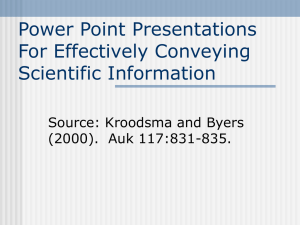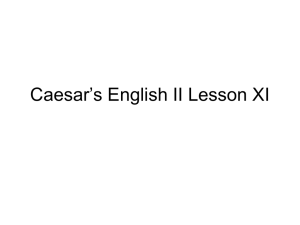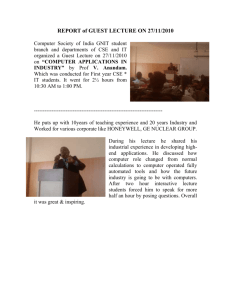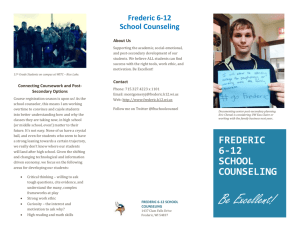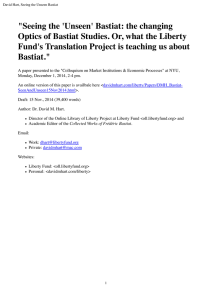Unfair Competition With The Sun
advertisement
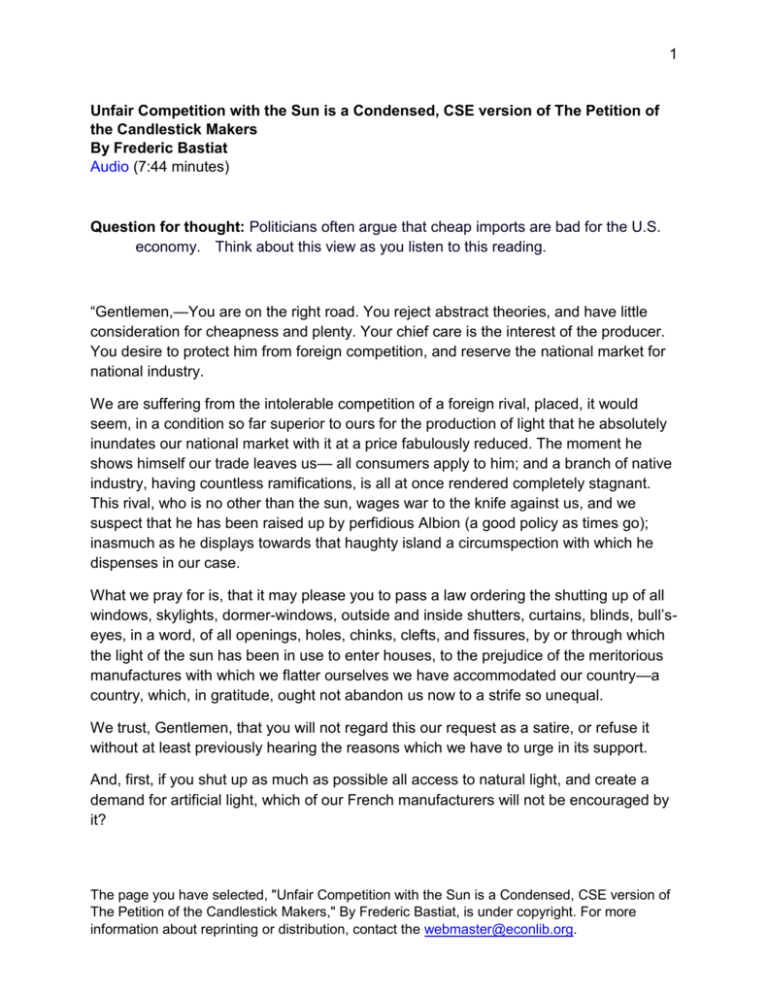
1 Unfair Competition with the Sun is a Condensed, CSE version of The Petition of the Candlestick Makers By Frederic Bastiat Audio (7:44 minutes) Question for thought: Politicians often argue that cheap imports are bad for the U.S. economy. Think about this view as you listen to this reading. “Gentlemen,—You are on the right road. You reject abstract theories, and have little consideration for cheapness and plenty. Your chief care is the interest of the producer. You desire to protect him from foreign competition, and reserve the national market for national industry. We are suffering from the intolerable competition of a foreign rival, placed, it would seem, in a condition so far superior to ours for the production of light that he absolutely inundates our national market with it at a price fabulously reduced. The moment he shows himself our trade leaves us— all consumers apply to him; and a branch of native industry, having countless ramifications, is all at once rendered completely stagnant. This rival, who is no other than the sun, wages war to the knife against us, and we suspect that he has been raised up by perfidious Albion (a good policy as times go); inasmuch as he displays towards that haughty island a circumspection with which he dispenses in our case. What we pray for is, that it may please you to pass a law ordering the shutting up of all windows, skylights, dormer-windows, outside and inside shutters, curtains, blinds, bull’seyes, in a word, of all openings, holes, chinks, clefts, and fissures, by or through which the light of the sun has been in use to enter houses, to the prejudice of the meritorious manufactures with which we flatter ourselves we have accommodated our country—a country, which, in gratitude, ought not abandon us now to a strife so unequal. We trust, Gentlemen, that you will not regard this our request as a satire, or refuse it without at least previously hearing the reasons which we have to urge in its support. And, first, if you shut up as much as possible all access to natural light, and create a demand for artificial light, which of our French manufacturers will not be encouraged by it? The page you have selected, "Unfair Competition with the Sun is a Condensed, CSE version of The Petition of the Candlestick Makers," By Frederic Bastiat, is under copyright. For more information about reprinting or distribution, contact the webmaster@econlib.org. 2 We foresee your objections, Gentlemen, but we know that you can oppose to us none but such as you have picked up from the effete works of the partisans of Free Trade. We defy you to utter a single word against us which will not instantly rebound against yourselves and your entire policy. You will tell us that, if we gain by the protection which we seek, the country will lose by it, because the consumer must bear the loss. We answer: You have ceased to have any right to invoke the interest of the consumer for, whenever his interest is found opposed to that of the producer, you sacrifice the latter. You have done so for the purpose of encouraging workers and those who seek employment. For the same reason you should do so again. You have yourselves obviated this objection. When you are told that the consumer is interested in the free importation of iron, coal, corn, textile fabrics—yes, you reply, but the producer is interested in their exclusion. Well, be it so; if consumers are interested in the free admission of natural light, the producers of artificial light are equally interested in its prohibition. If you urge that the light of the sun is a gratuitous gift of nature, and that to reject such gifts is to reject wealth itself under pretense of encouraging the means of acquiring it, we would caution you against giving a death-blow to your own policy. Remember that hitherto you have always repelled foreign products, because they approximate more nearly than home products to the character of gratuitous gifts. Nature and human labor co-operate in various proportions (depending on countries and climates) in the production of commodities. The part which nature executes is very gratuitous; it is the part executed by human labor which constitutes value, and is paid for. If a Lisbon orange sells for half the price of a Paris orange, it is because natural, and consequently gratuitous, heat does for the one what artificial, and therefore expensive, heat must do for the other. When an orange comes to us from Portugal we may conclude that it is furnished in part gratuitously, in part for an onerous consideration; in other words, it comes to us at halfprice as compared with those of Paris. Now, it is precisely the gratuitous half (pardon the word) which we contend should be excluded. You say, how can national labour sustain competition with foreign labour, The page you have selected, "Unfair Competition with the Sun is a Condensed, CSE version of The Petition of the Candlestick Makers," By Frederic Bastiat, is under copyright. For more information about reprinting or distribution, contact the webmaster@econlib.org. 3 when the former has all the work to do, and the latter only does one-half, the sun supplying the remainder. But if this half, being gratuitous, determines you to exclude competition, how should the whole, being gratuitous, induce you to admit competition? If you were consistent, you would, while excluding as hurtful to native industry what is half gratuitous, exclude a fortiori and with double zeal, that which is altogether gratuitous. One more, when products such as coal, iron, corn, or textile fabrics are sent us from abroad, and we can acquire them with less labour than if we made them ourselves, the difference is a free gift conferred upon us. The gift is more or less considerable in proportion as the difference is more or less great. It amounts to a quarter, a half, or three-quarters of the value of the product, when the foreigner only asks us for threefourths, a half or a quarter of the price we should otherwise pay. It is as perfect and complete as it can be, when the donor (like the sun is furnishing us with light) asks us for nothing. The question, and we ask it formally, is this: Do you desire for our country the benefit of gratuitous consumption, or the pretended advantages of onerous production? Make your choice, but be logical; for as long as you exclude as you do, coal, iron, corn, foreign fabrics, in proportion as their price approximates to zero what inconsistency it would be to admit the light of the sun, the price of which is already at zero during the entire day!” Concluding questions: Do trade restrictions such as tariffs and quotas increase domestic employment? Do the restrictions help Americans achieve higher income levels? Why or why not? Citation Bastiat, Frederic. Economic Sophisms. Library of Economics and Liberty. Retrieved November 20, 2014 from the World Wide Web: http://www.econlib.org/library/Bastiat/basSoph3.html The page you have selected, "Unfair Competition with the Sun is a Condensed, CSE version of The Petition of the Candlestick Makers," By Frederic Bastiat, is under copyright. For more information about reprinting or distribution, contact the webmaster@econlib.org.
